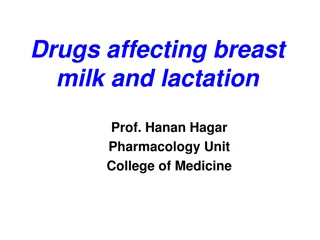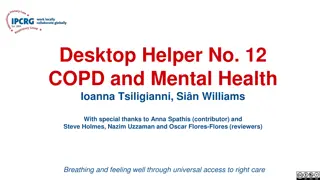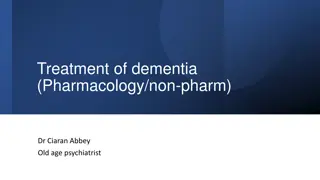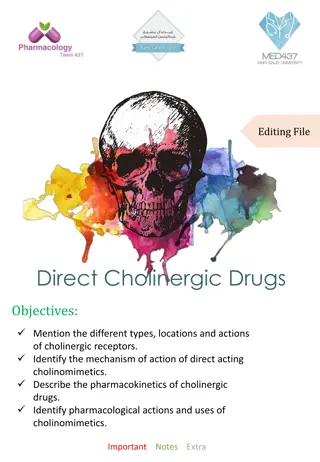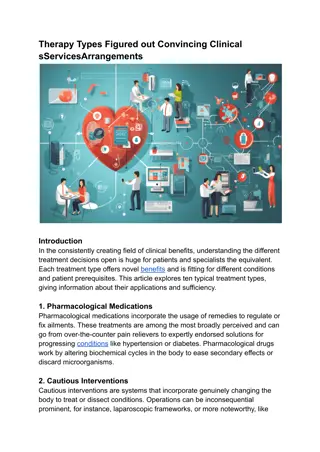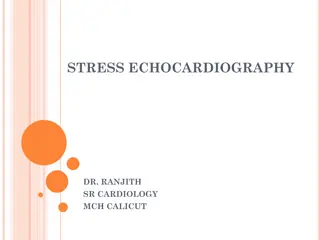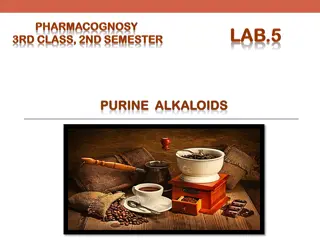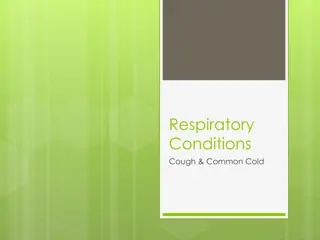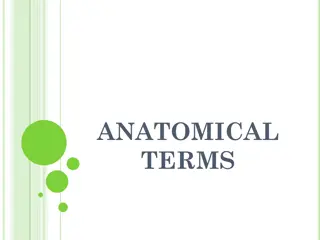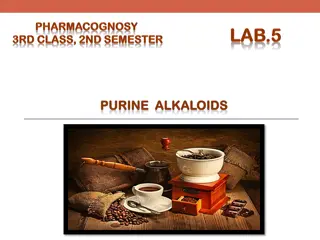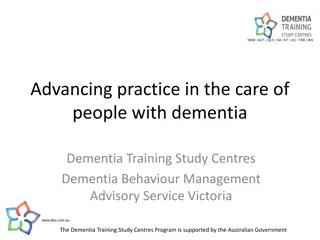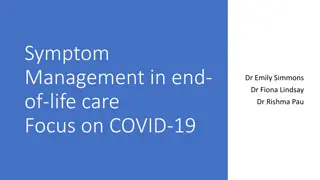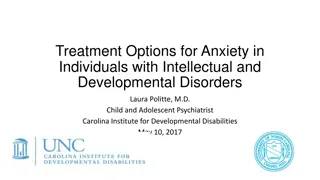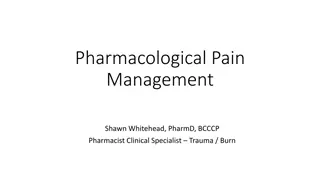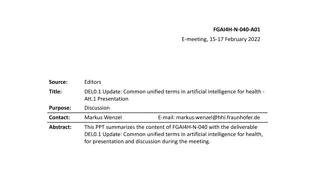Conventions for Referring to Indigenous Peoples in Canada and the USA
This article outlines guidelines for referring to Indigenous Peoples, emphasizing specificity and respect for preferred names and terms. It discusses the importance of capitalizing terms related to Indigenous Nations and cautions against using terms implying colonial possession. The use of terms lik
1 views • 24 slides
Appropriate use of antipsychotics for changed behaviours in people living with dementia
Dementia is characterized by various changes, including behaviours such as wandering, disinhibition, agitation, and aggression. People living with dementia require care that can be approached through non-pharmacological and pharmacological strategies. The overreliance on psychotropic medications lik
0 views • 25 slides
Understanding Posology in Pharmacology: Factors Affecting Drug Dosage
Posology, the science of determining drug dosage, is influenced by various factors including age, sex, body weight, route of administration, and more. Changes in pharmacokinetics with age, differing drug responses in men and women, and the importance of body weight in dosing are crucial consideratio
6 views • 23 slides
Indirect-Acting Cholinergic Drug
Explore the classification, mechanism of action, and pharmacological effects of indirect-acting cholinergic drugs such as anticholinesterases. Learn about the importance, main uses, adverse effects, and contraindications of these drugs. Discover how anticholinesterases increase acetylcholine concent
1 views • 16 slides
Understanding Osteogenesis Imperfecta: Causes, Types, and Treatment
Osteogenesis Imperfecta is a genetic disorder affecting bones, with various types ranging from mild to severe. It is caused by mutations in specific genes and is characterized by bone fragility, fractures, and other skeletal deformities. Diagnosis involves clinical and genetic tests. Management incl
1 views • 13 slides
DIGITAL MARKETING
DigiManiac Terms and Conditions\nWelcome to DigiManiac! Before you proceed with using our website and purchasing our online courses, please carefully read and understand the following terms and conditions. By accessing or using our website ( ), you agree to comply with and be bound by these terms. I
1 views • 5 slides
Understanding the Urinary System: Anatomical Structures and Terms
This informative content delves into the anatomical structures and terms related to the urinary system, covering key components such as the kidneys, ureters, bladder, and urethra. It explains important terms like renal pyramids, calices, and ureter dexter/sinister, providing a comprehensive overview
1 views • 8 slides
Essential Music Theory Terms and Concepts by Mr. Silvagni
Explore key music theory terms and concepts explained by Mr. Silvagni. Delve into Italian heritage in music terminology, clarifying terms, dynamics, tempo, and Italian tempo terms. Enhance your understanding of performance terms crucial for mastering music theory.
1 views • 16 slides
Understanding Drugs and Lactation: Pharmacological Considerations in Breastfeeding
Learn about the impact of various medications on breast milk and lactation, including identifying adverse effects on babies, safe medication choices for breastfeeding women with specific conditions, drugs affecting lactation, and pharmacokinetic changes in pediatric populations.
0 views • 43 slides
Understanding Medications and Pharmacological Therapy for Urinary Incontinence
This learning module for clinicians discusses the physiology of bladder control, age-related changes in the genitourinary system, medications that contribute to urinary incontinence, pharmacological treatments for UI, side effects of medications used for UI, and a senior-friendly approach to optimiz
0 views • 30 slides
Pharmacology Quizzes on Diuretics and Their Clinical Applications
This content presents a series of quizzes involving diuretics and their role in clinical scenarios related to heart failure, glaucoma, renal hemodynamics, and intracranial pressure. Questions cover various diuretic agents such as furosemide, acetazolamide, mannitol, and hydrochlorothiazide, focusing
0 views • 10 slides
Managing Mental Health in COPD Patients: Practical Insights and Interventions
Mental health issues are prevalent among COPD patients, affecting about 30% to 80% with comorbid depression and anxiety. This article aims to raise awareness among primary care professionals about identifying and managing mental health problems in COPD patients. Strategies include non-pharmacologica
1 views • 11 slides
Understanding Clinical Pharmacokinetic and Pharmacodynamic Concepts
Clinical pharmacokinetics involves applying pharmacokinetic principles to personalize medication dosages for optimal therapeutic effects while minimizing adverse reactions. It covers drug absorption, distribution, metabolism, and excretion. Pharmacodynamics focuses on the relationship between drug c
0 views • 55 slides
Comprehensive Overview of Dementia Treatment Strategies
Dementia, a syndrome resulting from various diseases affecting nerve cells and brain function, leads to cognitive decline. Treatment approaches include pharmacological and non-pharmacological interventions such as biomarker monitoring, lifestyle modifications, and addressing risk factors like hypert
0 views • 12 slides
Understanding Cholinergic Drugs: Receptors, Actions, and Pharmacology
Learn about the types, locations, and actions of cholinergic receptors, the mechanism of action of direct-acting cholinomimetics, pharmacokinetics of cholinergic drugs, and the pharmacological actions and uses of cholinomimetics. Explore the roles of nicotinic and muscarinic receptors in the nervous
4 views • 12 slides
Overview of Anxiety Disorders and Antianxiety Drugs
Anxiety disorders are conditions characterized by excessive worry and fear that can interfere with daily life. Common types include generalized anxiety disorder, panic disorder, phobias, and OCD. Treatment options include psychotherapy and anxiolytic drugs such as benzodiazepines, 5HT1A agonists, be
0 views • 25 slides
Therapy Types Figured out Convincing Clinical services Arrangements
Understanding the variety of accessible medical care therapies is fundamental for coming to informed conclusions about your well-being. This article dives into ten normal therapy types, including pharmacological therapies, careful mediation, exercise
0 views • 4 slides
Understanding Physicochemical Properties of Drugs
The physicochemical properties of drugs play a crucial role in their pharmacological effects. These properties include physical and chemical characteristics that influence interactions with biomolecules. Solubility, partition coefficient, and dissociation constant are key factors affecting drug beha
1 views • 46 slides
Priorities and Quality Measures for Type 2 Diabetes Care in NHS GGC
Dr. Kashif Ali leads primary care for Type 2 diabetes, while Dr. James Boyle oversees secondary care in NHS GGC. The data from December 2018 shows the number of Type 2 diabetes patients, their care processes, HbA1c levels, and BMI status. The Diabetes Quality Improvement and Outcome Measures aim to
0 views • 27 slides
Pharmacological Management of Alzheimer's Disease and Cognitive Enhancers
Cognitive enhancers play a crucial role in managing Alzheimer's Disease, with Cholinesterase inhibitors (AChEI) like Donepezil, Galantamine, and Rivastigmine recommended for mild to moderate AD, and Memantine for moderate to severe cases. These medications act through different mechanisms, with AChE
0 views • 46 slides
Overview of Antitubercular Drugs: Introduction, Classification, and Applications
Tuberculosis is a chronic granulomatous disease caused by Mycobacterium bovis in ruminants and Mycobacterium avium in dogs and pigs. These bacteria have a unique waxy appearance due to their cell wall composition, providing a shield against pharmacological compounds. Antitubercular drugs play a cruc
3 views • 28 slides
Understanding Simplifying Algebraic Expressions in Pre-Algebra
Simplifying algebraic expressions involves identifying terms, like terms, coefficients, and constant terms. By combining like terms and following basic rules, expressions can be simplified to make solving equations easier for pre-algebra students.
0 views • 18 slides
Overview of Alkaloids in Pharmacology
Alkaloids are natural compounds found in various plants with diverse pharmacological properties. This lecture delves into alkaloids derived from sources like cinchona bark, discussing their structures, properties, and medical applications. It explores alkaloids such as quinine, quinidine, and ipecac
0 views • 17 slides
Understanding Basic Geometry Terms: Points, Lines, and Planes
Discover the fundamental concepts in geometry such as points, lines, and planes, which serve as the foundation for defining other geometric figures. Explore the definitions of these terms, their properties, and how they are used to construct various shapes. Dive into the importance of undefined term
0 views • 12 slides
Comprehensive Guide to Stress Echocardiography in Cardiology Practice
Stress echocardiography is a valuable tool in diagnosing and managing coronary artery disease, valvular heart disease, and assessing heart function. This imaging technique helps in detecting flow-limiting stenosis, understanding the ischemic cascade, and evaluating cardiac function during stress. Va
0 views • 49 slides
Understanding Purine Alkaloids and Their Pharmacological Activities
Purine alkaloids are a class of compounds with a unique structure, different from typical alkaloids. They include caffeine, theophylline, and theobromine, each with distinct effects on the body. These compounds are found in plants like coffee, tea, and cola, and have various pharmacological activiti
4 views • 15 slides
Understanding Cough and Common Cold
Cough is a reflex action to clear airways, often caused by viral infections. It can be productive or non-productive, acute, sub-acute, or chronic. Assessing cough duration, nature, associated symptoms, drug-induced or condition-induced factors is crucial. Non-pharmacological treatments include steam
1 views • 31 slides
End-of-Life Symptom Management for COVID-19 Patients: A Comprehensive Guide
This comprehensive guide focuses on symptom management in end-of-life care for COVID-19 patients, covering identification of signs of dying, communication with residents and families, recognition of end-of-life symptoms, and pharmacological/non-pharmacological approaches. It also provides valuable r
0 views • 19 slides
Anatomical Terminology Evolution: From Latin to Modern Standards
Anatomical terms have evolved over centuries into a unified nomenclature system known as Nomina anatomica. This system, initially based on Latin and Greek words, faced confusion and disagreement among anatomists, leading to revisions and the introduction of modern anatomical terminology. The structu
0 views • 27 slides
Pharmacotherapy Overview of Parkinson's Disease and Related Disorders
Overview of pharmacological treatment options for Parkinson's disease and related conditions like choreatic dyskinesias, spastic disorders, and myasthenia gravis. Describes the degenerative process of Parkinson's disease, its symptoms, and the pharmacological interventions targeting dopamine deficit
0 views • 26 slides
Understanding Purine Alkaloids: Properties, Isolation, and Pharmacological Activities
Purine alkaloids are a group of compounds with unique characteristics, such as a heterocyclic nucleus and specific methylated forms like caffeine, theophylline, and theobromine. While they have diverse pharmacological activities like CNS stimulation and diuretic effects, their identification often i
0 views • 16 slides
Exploring Pain Relief Options in Labor
Provision of analgesia during childbirth varies among cultures, with some women preferring non-pharmacological methods like relaxation, breathing exercises, and warm water immersion, while others opt for pharmacological options such as opiates. Professionals play a crucial role in advising women on
0 views • 23 slides
Advancing Dementia Care: Treatment Options and Management Strategies
This content delves into the strategies for advancing the care of individuals with dementia, focusing on treatment and management options. It discusses the role of pharmaceuticals, legal considerations, safety measures, and the importance of avoiding physical restraints in dementia care. Non-pharmac
0 views • 13 slides
Symptom Management in End-of-Life Care: Focus on COVID-19
Review signs of dying, communicate effectively with residents and families, identify end-of-life symptoms (especially related to COVID-19), and explore non-pharmacological and pharmacological approaches for symptom management. Resources and guidance are provided for caring for individuals in the com
0 views • 19 slides
Understanding Heads of Terms and Deal Breakers in Property Management Agreements
Exploring the crucial aspects of Heads of Terms (HoTs) in property deals, uncovering deal-breaker terms that can impact negotiations, and emphasizing the importance of clarity and understanding for both landlords and tenants. The content delves into the complexities of property agreements and the si
0 views • 26 slides
Navigating Contract Terms and Negotiations: Key Considerations for ABA Providers
Industry professionals discuss essential considerations for ABA providers when navigating contract terms and negotiations, emphasizing the importance of understanding insurance guidelines, reviewing contract terms thoroughly, and being aware of key aspects such as timely filing deadlines and payment
0 views • 38 slides
New Terms for Settlement through the Natural Perils Pool
The Norwegian Natural Perils Pool has approved new terms for settlement, effective from 1 January 2016. These terms supersede the Common Terms and Conditions for Insurance Contracts covering damage from natural events since 2012. The new terms regulate settlement processes and set limits on company
0 views • 7 slides
Treatment Options for Anxiety in Individuals with Intellectual and Developmental Disorders
Explore unique presentations of anxiety in individuals with intellectual and developmental disorders, evaluate evidence-based interventions - both pharmacological and non-pharmacological, review practical strategies for managing anxiety symptoms, and identify barriers to treatment and future researc
0 views • 38 slides
Comprehensive Overview of Pharmacological Pain Management Strategies
This comprehensive overview covers various aspects of pharmacological pain management, including behavioral measures for patients unable to self-report pain, building pain regimens, NSAIDs use and associated risks, NSAIDs and COX selectivity, clinical presentation of pain symptoms, gabapentinoids fo
0 views • 22 slides
Establishing Common AI Terminology for Health: FGAI4H-N-040 Update
This update presentation summarizes FGAI4H-N-040, focusing on creating a glossary with unified AI terms for healthcare. The project aims to ensure consistent use of key terms across disciplines involved in AI for health. It includes a timeline of development, categorization of terms, and definitions
0 views • 10 slides








